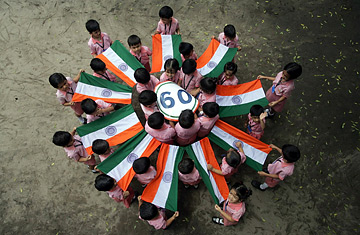
Schoolchildren hold Indian national flags as part of Independence Day celebrations at a school in the northeastern city of Siliguri, August 13, 2007.
The military band's quick and terse rendition of India's national anthem was greeted with a few hushed sighs and gentle nods, in keeping with the somber mood of the Independence Day festivities at the governor's mansion. There was little of the chest-thumping pride or fireworks on display for the few hundred guests — European consuls fiddling with ties in the muggy heat; old freedom fighters standing tall, their faces gaunt and expressionless. Sixty years after the waning British Empire hastily departed after jotting down some lines on a map turning one country into two, the Indian Subcontinent has cause to both mourn and celebrate the day of its bitterly won freedom. Indeed, Indian independence day ceremonies are largely stoic affairs, steeped in the memory of a nation that was dismembered at the moment of its birth.
Few places better convey the bittersweet legacy of Indian independence than the eastern city of Calcutta. It was here that Britain began building its dominion in India. The sprawling mansion that today houses the governor of West Bengal — a chiefly symbolic role akin to India's presidency — was, until 1911, the seat of British power throughout all of Asia. "When the house was built, the British Empire in India was like a little patchwork of crimson spots on the map of the Indian continent," then Viceroy Lord Curzon wrote of the significance of his former abode. "When it was abandoned [in 1911, when the capital was moved to New Delhi], that color had overspread and suffused the whole."
Today, the mansion is replete with contrasts, its busts of Roman emperors and pennant-bearing lancers on horseback an odd sight alongside the many dignitaries of the Communist Party, which has ruled the state for the last 30 years — a fact that some joke is further evidence of Calcutta's status as a graveyard of the relics of the past.
The ghosts that haunt independence day celebrations, however, hail from the very end of the colonial era: At the governor's mansion, writers, intellectuals and other well-to-do Calcuttans watched footage on video screens displaying the traumatic communal violence that wracked the city when Britain partitioned India into the separate Hindu-majority and Muslim-majority states of India and Pakistan. The unmistakable figure of a frail, cotton-clad Mahatma Gandhi appeared throughout the video. India's founding father bitterly opposed partition, declaring famously, "Let it not be said that Gandhi was party to India's vivisection. Let posterity know what agony this old soul went through thinking of it." Gandhi had stayed in Calcutta sixty years ago when India and Pakistan were born in blood.
Presiding over the ceremony is Gandhi's grandson, the current Governor Gopalkrishna Gandhi. And following the presentation, in an act of commemoration, he set off in a convoy to Beliaghata, a poor Muslim locality in the outskirts of the city. This was where his grandfather, at the height of tensions in 1947, had moved into accommodations far more humble than the Viceroy's Palace. Hindu refugees fleeing death and persecution in East Bengal (soon to be made into East Pakistan and later independent Bangladesh) besieged Muslim areas like Beliaghata seeking revenge for their sufferings. Gandhi sought to deter further killings by living among Muslims himself, and he embarked on a hunger strike against communal violence that generated such public shame and outrage that sectarian tensions in the city gave way to universal concern for the aging man of principle. Gandhi broke his fast as weeping rioters laid their machetes at his feet.
On Wednesday, hundreds, if not thousands, of ordinary Calcuttans flocked around the Governor's convoy as it approached the recently refurbished house where Gandhi had starved and saved Calcutta in 1947. They filled its courtyard and crammed the gully lanes winding along its sides that had once been overrun by those angry mobs. Far from the dignified solemnity of the old Viceroy's Palace, dozens chattered and applauded when the Governor laid flower petals at an altar to Gandhi. Crowds of enthusiastic well-wishers turned his polite withdrawal into a prolonged retreat.
What may be most revealing about the moment is that on the 60th anniversary of India's independence, many see Gandhi's sacrifice in pursuit of communal harmony as more moving than the triumph of expelling the British. Poverty and communal tensions still trouble India, and cloud its future. As the country's economy booms, hundreds of millions like those gathered around Gandhi's humble dwelling are on the outside looking in. It's reported that on August 15, 1947, West Bengal's newly appointed administrators came to the Mahatma in Beliaghata to seek his blessings. He responded ominously. "Today, you have worn on your head a crown of thorns," Gandhi said. "You had been put to test during the British regime. But in a way it was no test at all... [for] now there will be no end to your being tested." And that holds true as much today as it did sixty years ago.
